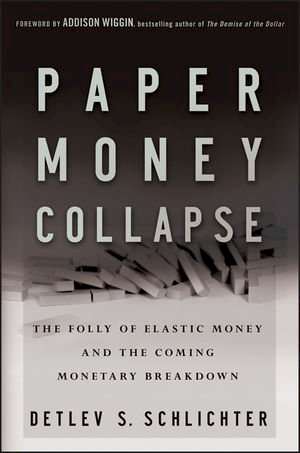23 April 2013
Paper Money Collapse
The Folly of Elastic Money and the Coming Monetary Breakdown
Detlev Schlichter
2011, Wiley, 288 pages, £26.99
ISBN 9781118095751
Reviewer: Dave Birch, Consult Hyperion

We might imagine the current monetary system of nation-state fiat currencies to be a law of nature, but it isn’t. Detlev Schlichter sets out his stall by observing, accurately, that, “Money was not invented by the state and is not a natural monopoly of the state.” We think central banks, US dollars and £5 notes are an unchanging and immutable way to organise the unit of account, means of exchange, store of value and mechanism for deferred payments, but they are not. The way they work is the consequence of a combination of technological, business and political factors. The way they work right now, what Schlichter calls the “paper money” system, is the result of specific historical paths, and is of little antiquity. In fact it has only just turned 40 and, if he is to be believed, is having something of a mid-life crisis. It’s time for a change.
Why does it seem hard for people to imagine that this system might be coming to an end? Why is the discussion of alternative monetary arrangements - whether the essentially reactionary commodity system that Schlichter favours (not without evidence, I hasten to add) or more revolutionary alternatives rooted in more distributed, community systems - seen as the province of cranks? Schlichter says that he is not putting forward a conspiracy theory but merely noting that a substantial fraction of the world’s economists are dependent on the current system because they work for the institutions of paper money, the state-bank complex or the financial sector that benefits from fractional reserve banking, but it is fair to note that there is often the whiff of conspiracy theory around the edges of what we might call the ‘gold movement’. He steers clear of this, attributing the credit explosion to greed, incompetence and tragedy rather than Illuminati puppetry, and this is the main reason I found this book enjoyable and relevant (albeit a tiny bit repetitive in places).
Schlichter’s analysis is founded in monetary-cycle theory that blames government control over money for the misallocation of resources that resulted in the financial crisis and sees as a central problem in this the age-old temptation to over-issue ‘paper’ money. He therefore spends the main part of the book arguing for a return to a gold standard and goes to great lengths to show how this would result in more stable economies. Given the observed behaviour of many governments, who would not have some sympathy with the idea of locking them in the straightjacket of the gold standard again? Yet one must wonder if this is really the best option, since there are many social and political factors that mean that sometimes governments might have to monkey with the money supply because it’s the right thing to do.
I did feel a sense of doom pervading the pages. The book twice quotes Ludwig von Mises (from 1949) saying that, “There is no means of avoiding the final collapse of a boom brought about by credit expansion. The alternative is only whether the crisis should come sooner as the result of a voluntary abandonment of further credit expansion or later as a final and total catastrophe of the currency system involved.” Schlichter thinks (as do I) that Parliamentary social democracy makes the former exit unlikely and the latter almost certain. Perhaps I’m wrong, but the way in which he talks about a ‘cleansing correction’ to the economy almost makes it sound as if he is looking forward to it.
Personally, I found the most interesting part of the book was toward the end, when Schlichter begins to speculate on what might replace the current system. I would have liked to have seen more of his thoughts on this topic, but he truncates the discussion saying, “Could mankind at some stage come across a better form of money? Theoretically, yes, but no alternative is in sight.”
Yet alternatives are in sight. I think that Schlichter is right to suggest that current arrangements are moving toward the end of their useful life but, as a technologist, I think he does not take sufficient account of the role of technology in the new economic environment. Early in the book he says that technology might dissolve the distinction so that every store of value becomes a means of exchange but doesn’t follow the argument through later in the book. I’m not sure that any monetary system based on a single currency, whether gold, platinum or British Airways Avios can deliver the stability that society needs, but if we did decide to go down that route then his defence of the gold standard is robust.
Just as the inhabitants of England at the time of the Glorious Revolution could not have imagined the Bank of England, trusted coinage and Gold Standard of a generation later, we are seeing the problems of a monetary system unsuited to the economy it supports and unable to imagine the money it needs.
